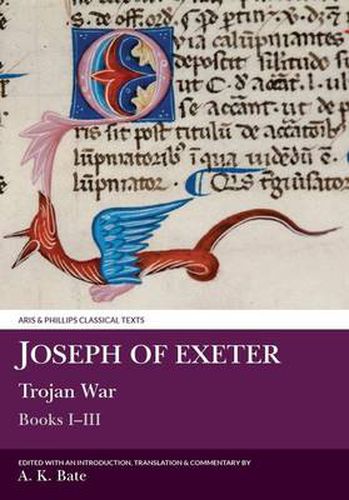Readings Newsletter
Become a Readings Member to make your shopping experience even easier.
Sign in or sign up for free!
You’re not far away from qualifying for FREE standard shipping within Australia
You’ve qualified for FREE standard shipping within Australia
The cart is loading…






Joseph wrote his epic around the year 1180, and revised it at the court of Henry II of England where he had obtained some sort of post through the influence of his uncle, Baldwin, Archbishop of Canterbury. The work is one of a series of texts in Latin and Anglo-Norman, apparently commissioned by the King, helping to trace back the Plantagenet line to the Trojans. It is a pendant to the Anglo-Norman Roman de Troie written by Benoit de Sainte-More in the 1160s. Joseph rejected the Vergilian ‘mendacious poetic’ account of the war in favour of the ‘historical’ narrative of Dares Phrygius, an ‘eye-witness’ of the events. This version not only coincided with the Plantagenets’ preference for historical material but also presented Aeneas, the founder of the Romans, as a traitor. In Henry’s struggles with the Pope over the Investiture problem any slur on the origins of the Romans could be useful ammunition. Books I-III cover the first Trojan war when Laomedon was besieged, the Judgement of Paris and the Rape of Helen. In style Joseph closely resembles Lucan whom he had read with an eye that allowed little to escape (Raby), yet his imitation is far from servile. Sedgwick even goes so far as to say that Joseph
surpasses the bold constructions of Silver Latin . Moreover, Joseph restores to epic the gods that Lucan had banished. The result is an epic that in the 17th century was still considered to have been written in the classical period. Latin text with facing-page English translation, introduction and commentary.
$9.00 standard shipping within Australia
FREE standard shipping within Australia for orders over $100.00
Express & International shipping calculated at checkout
Joseph wrote his epic around the year 1180, and revised it at the court of Henry II of England where he had obtained some sort of post through the influence of his uncle, Baldwin, Archbishop of Canterbury. The work is one of a series of texts in Latin and Anglo-Norman, apparently commissioned by the King, helping to trace back the Plantagenet line to the Trojans. It is a pendant to the Anglo-Norman Roman de Troie written by Benoit de Sainte-More in the 1160s. Joseph rejected the Vergilian ‘mendacious poetic’ account of the war in favour of the ‘historical’ narrative of Dares Phrygius, an ‘eye-witness’ of the events. This version not only coincided with the Plantagenets’ preference for historical material but also presented Aeneas, the founder of the Romans, as a traitor. In Henry’s struggles with the Pope over the Investiture problem any slur on the origins of the Romans could be useful ammunition. Books I-III cover the first Trojan war when Laomedon was besieged, the Judgement of Paris and the Rape of Helen. In style Joseph closely resembles Lucan whom he had read with an eye that allowed little to escape (Raby), yet his imitation is far from servile. Sedgwick even goes so far as to say that Joseph
surpasses the bold constructions of Silver Latin . Moreover, Joseph restores to epic the gods that Lucan had banished. The result is an epic that in the 17th century was still considered to have been written in the classical period. Latin text with facing-page English translation, introduction and commentary.